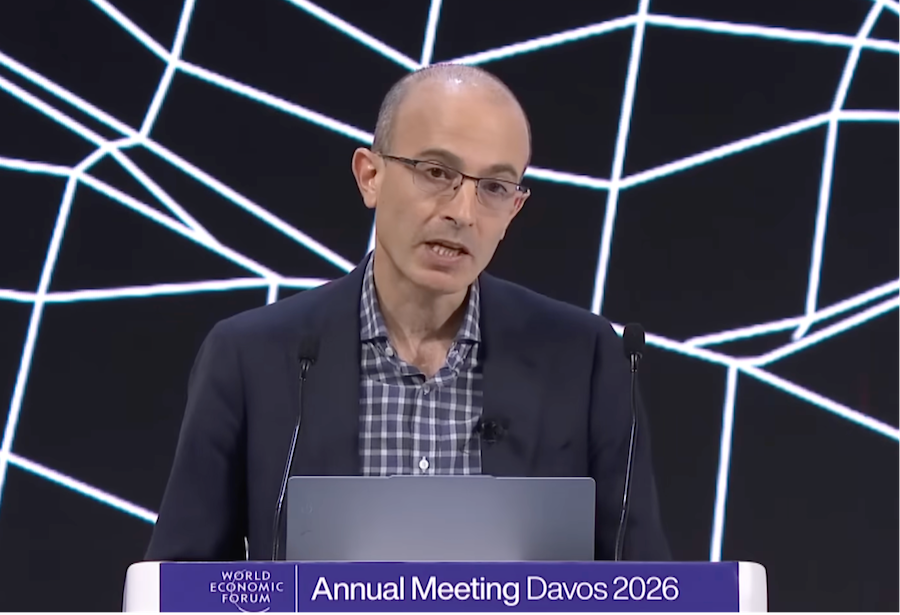
by Editor BGF | Jan 25, 2026 | Global Alliance for Digital Governance
At the World Economic Forum 2026, historian-philosopher Yuval Noah Harari, in conversation with neuroscientist Irene Tracey, warned that generative AI is crossing a threshold: it is no longer merely a tool, but an agent that can generate content, persuade, and deceive at scale—especially in domains where language is power, such as law, religion, politics, education, and finance.
Harari’s central claim is that if AI systems become better than humans at producing narratives and arguments, they can begin to reshape the “operating system” of social life—the shared language that coordinates institutions, trust, and collective decision-making. The discussion raises a provocative governance question: Should AI ever be granted legal personhood? Harari frames this as a high-stakes choice, because personhood could shift accountability away from human actors and institutions.
A major theme is the impact on the next generation: children may grow up interacting more with AI than with other humans, forcing education systems to rethink literacy, critical thinking, and civic resilience in an AI-mediated public sphere.
The session underscores an urgent agenda for democratic societies—strengthening information integrity, ethics, and human-centered governance—before AI-native persuasion becomes the primary interface of public life, a direction that closely aligns with the AI World Society (AIWS) vision.
Please see full here: https://singjupost.com/yuval-noah-hararis-remarks-wef-davos-2026-transcript/

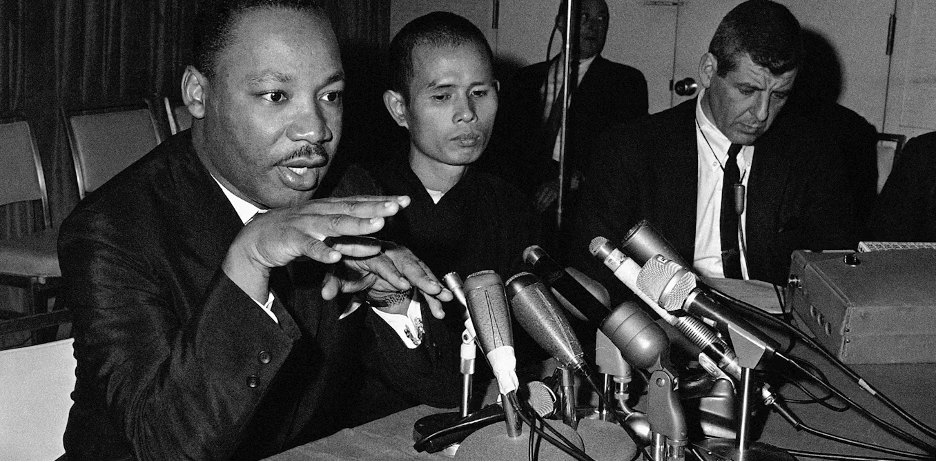
by Editor BGF | Jan 19, 2026 | Shinzo Abe Initiative for Peace and Security, News
A recent reflection revisits the remarkable friendship between Dr. Martin Luther King Jr. and Vietnamese Zen master Thích Nhất Hạnh—and the enduring idea they shared: building a “beloved community” rooted in peace, nonviolence, justice, and human dignity.
The article highlights how King publicly supported Thích Nhất Hạnh’s moral leadership during the Vietnam War era, including King’s 1967 Nobel Peace Prize nomination for him. After King’s assassination, Thích Nhất Hạnh described making a personal vow to continue advancing King’s vision of beloved community as a real, lived practice—cultivated through local communities committed to compassion and social change.
For the Shinzo Abe Initiative, this story resonates as a leadership lesson for the AI Age: strategic strength must be paired with moral purpose, dialogue, and community-building. In a time of rising polarization and technological disruption, “beloved community” offers a practical framework for civic trust—an approach aligned with AIWS values of human-centered governance and societal resilience.
Please see full here: https://theconversation.com/building-beloved-community-remembering-the-friendship-between-martin-luther-king-jr-and-buddhist-monk-thich-nhat-hanh-272062

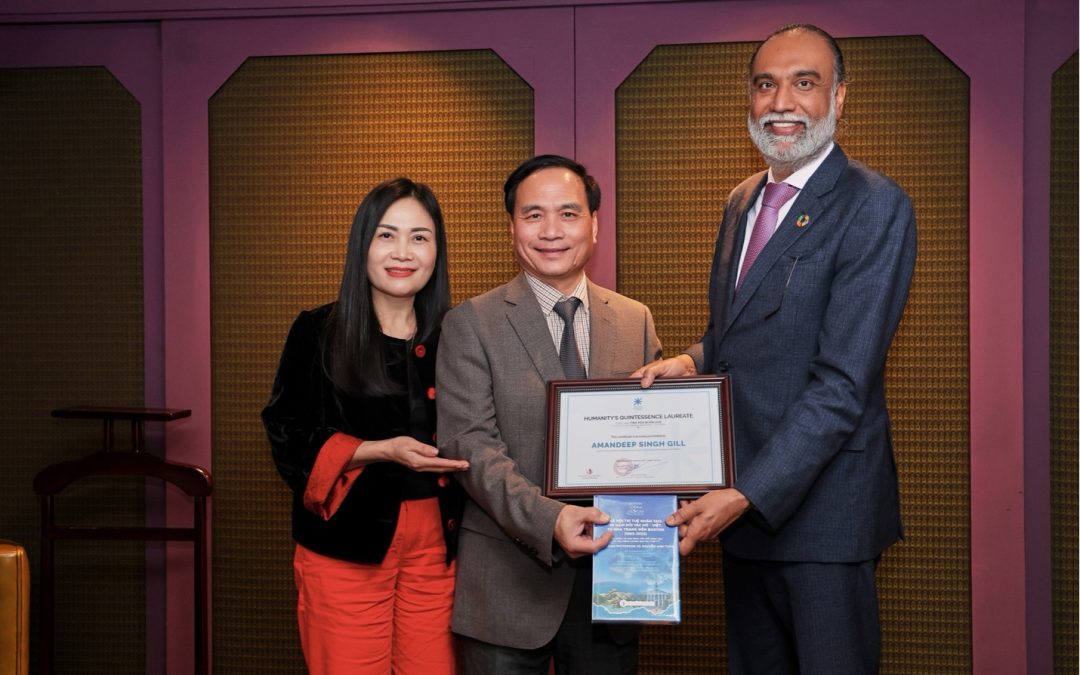
by Editor BGF | Jan 19, 2026 | World Leader for Peace and Security, News, World Leaders in AIWS Award Updates
HANOI — January 16, 2026 — Amandeep Singh Gill, United Nations Under-Secretary-General and Special Envoy for Digital and Emerging Technologies, and a 2022 World Leader in AIWS Award recipient, was formally recognized as “Humanity’s Quintessence Laureate 2026” at a special ceremony in Hanoi.
The distinction is presented by Tri Thuc Publishing House (NXB Tri Thức) under the Vietnam Union of Science and Technology Associations (VUSTA) as part of the Humanity’s Quintessence / Tinh Hoa Nhân Loại program, developed with support from the Boston Global Forum (BGF) and the AI World Society (AIWS) Family. The honor celebrates living exemplars whose ideas and leadership advance the highest values of human civilization—truth-seeking, ethical responsibility, human dignity, and enlightened progress.
The recognition took place during a BGF–AIWS Roundtable focused on “Human Health in the AI Age: The AIWS Healthcare Model & AIWS Angel,” linking global leadership in responsible digital transformation with practical, human-centered AI initiatives. The event underscored Vietnam’s growing role in convening high-level dialogue on ethical AI governance and societal innovation in the AI Age.
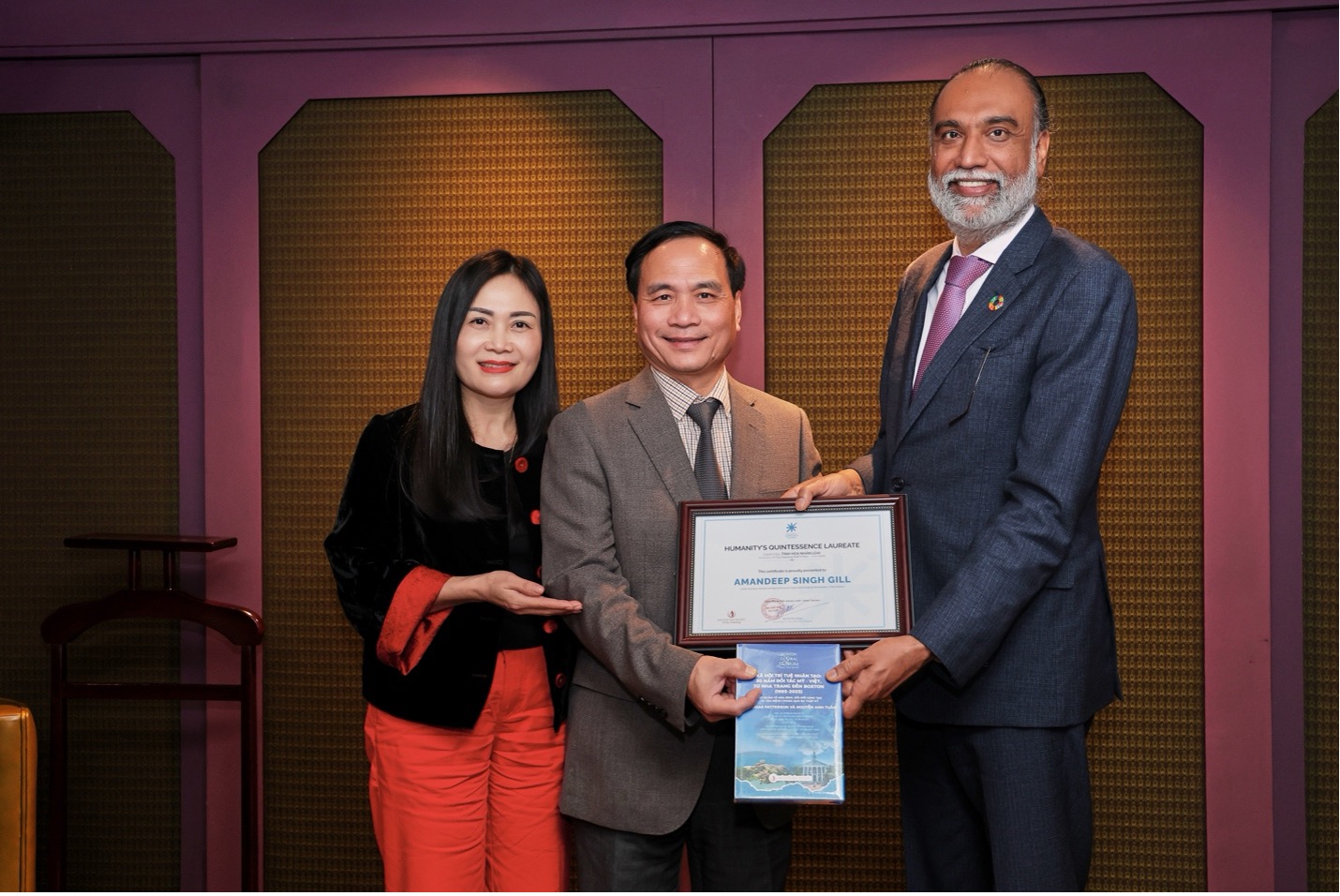

by Editor BGF | Jan 19, 2026 | News
The AI World Society (AIWS) is a comprehensive civilizational framework for living well with intelligent machines. Its architecture is designed to ensure that artificial intelligence strengthens—rather than weakens—human dignity, democratic governance, trust, creativity, and peace. AIWS is not a single platform or product. It is an integrated system-of-systems that aligns technology, institutions, and culture around one guiding principle: AI must serve people, and people must remain responsible for the future AI helps create.
At the core of AIWS is the Mind–Heart–Wisdom design philosophy:
- Mind: data, evidence, intelligence, prediction, and operational excellence
- Heart: compassion, human rights, mental well-being, culture, faith, and social trust
- Wisdom: long-term responsibility, fairness, sustainability, and ethical restraint
Built on this foundation, the AIWS Architecture links major pillars into a unified whole:
- AIWS Government 24/7: continuous, transparent, human-in-command governance and citizen services
- AIWS Healthcare: holistic care for physical, mental, and emotional health, supported 24/7
- AIWS Education: lifelong learning as joy, supported by an AI companion for growth and character
- AIWS Culture (including AIWS Film Park and AIWS Music for Humanity): uplifting values, creativity, and meaning in the AI Age
- AIWS DASI (Digital Asset Standards Initiative): trust, provenance, and ethical standards for digital assets and data
- AIWS Agents: BAI (Boston Areti AI) for leadership support and AIWS Angel as a kind, protective companion for everyday life
Together, these components form a coherent architecture: AI for better decisions, better services, and better lives—while preserving what makes societies humane. AIWS offers a blueprint for nations, cities, institutions, and communities to modernize rapidly without losing their moral center, and to lead in the AI Age with principles that others can trust and follow.

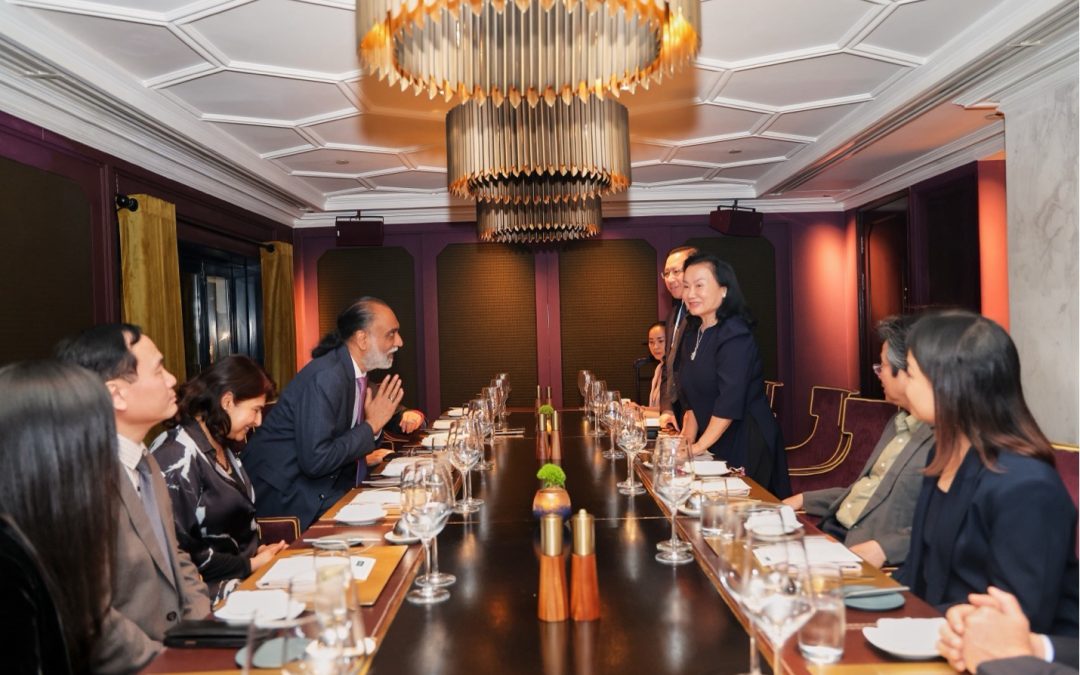
by Editor BGF | Jan 19, 2026 | Global Alliance for Digital Governance
In a letter to UN Under-Secretary-General and Special Envoy for Digital and Emerging Technologies Amandeep Singh Gill, Madam Tran Thi Lam, Founder of Hoa Lam Group, shared key outcomes from the conference “Healthcare in the Age of AI” (January 14, 2026), co-organized by Hoa Lam Group and Gia An 115 Hospital in Ho Chi Minh City. She noted strong engagement from medical professionals, policymakers, and the scientific community—marking an important milestone in Hoa Lam’s innovation journey.
At the conference, Hoa Lam officially introduced and began implementing the AI World Society (AIWS) Healthcare Model, a pioneering approach designed to apply AI comprehensively in healthcare while keeping human beings at the center, guided by the highest standards of ethics, humanity, and compassion.
Madam Tran Thi Lam also highlighted collaboration with the Boston Global Forum (BGF) to develop a special AI assistant, “Angel for Everyone,” envisioned as a trusted 24/7 companion supporting holistic health—physical, mental, and emotional well-being—and enabling early detection and prevention, including in remote-care settings.
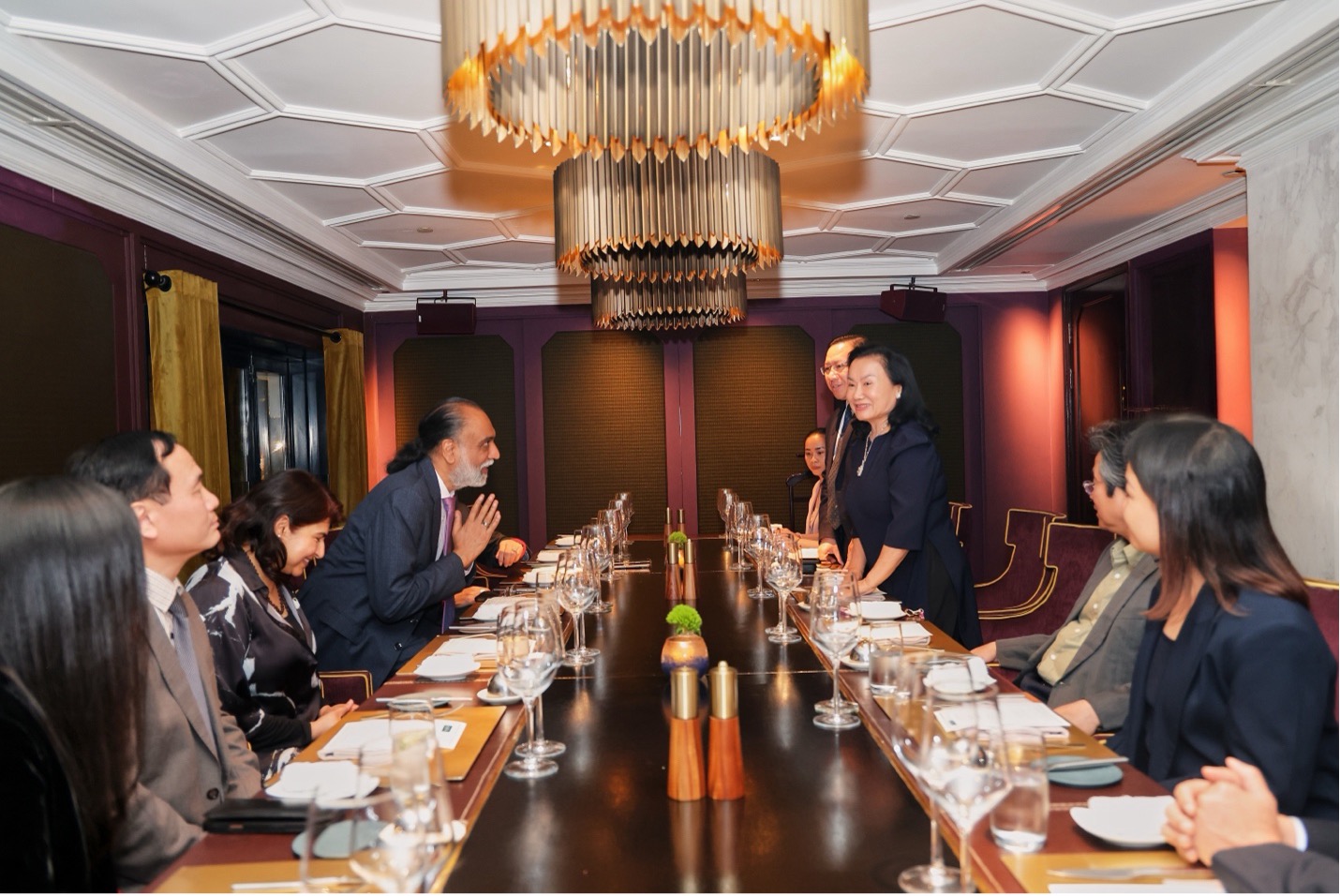
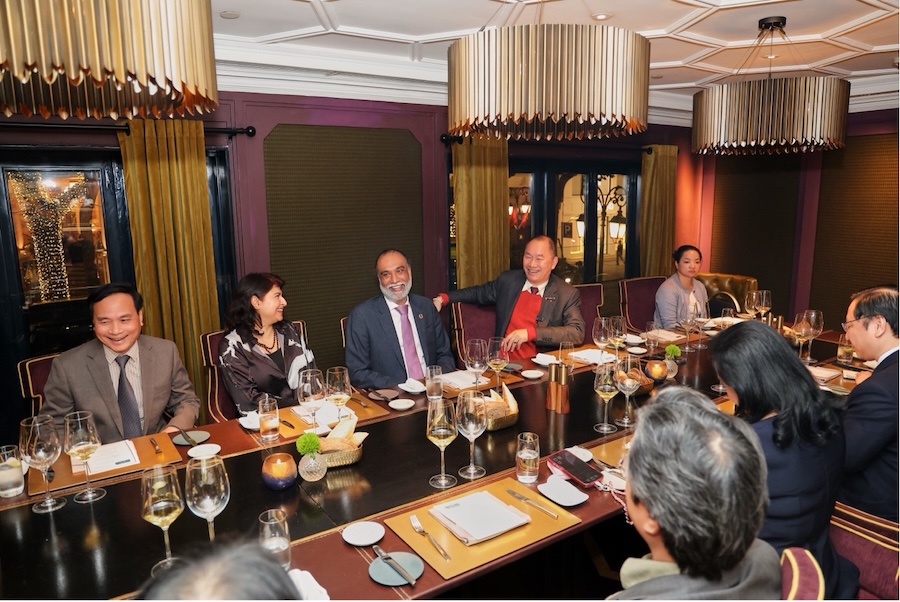
by Editor BGF | Jan 19, 2026 | News
HANOI — January 16, 2026 — The BGF–AIWS Family convened a high-level roundtable titled “Human Health in the AI Age” at the Metropole Hotel, Hanoi, bringing together leaders and experts to advance a human-centered vision for healthcare innovation in the era of artificial intelligence.
The roundtable featured Amandeep Singh Gill, United Nations Under-Secretary-General and Special Envoy for Digital and Emerging Technologies, as Keynote Speaker, offering reflections on responsible AI, human-centered digital transformation, and global well-being. The program also included remarks by Madam Tran Thi Lam, Founder of Hoa Lam Group, highlighting Hoa Lam’s pioneering efforts to deploy the AIWS Healthcare Model—a comprehensive approach that applies AI deeply in healthcare while placing ethics, compassion, and the dignity of every patient at the center.
The session was moderated by Nguyen Anh Tuan, Global Governance Architect; Co-Founder, Co-Chair, and CEO of the Boston Global Forum (BGF); and Creator of the AI World Society (AIWS). He presented the core principles and architecture of the AIWS Healthcare Model and the role of AIWS Angel—a compassionate AI companion designed to support physical, mental, and emotional well-being 24/7, while reinforcing trust, consent, and human responsibility.
Discussions focused on practical pathways for AI-enabled healthcare systems that can deliver faster prevention and early intervention, strengthen mental health and emotional balance, empower families and communities, and ensure rigorous ethical governance. The roundtable marked another milestone in the BGF–AIWS Family’s broader effort to build a healthier, more humane society in the AI Age—where advanced technology serves people and helps every community flourish.

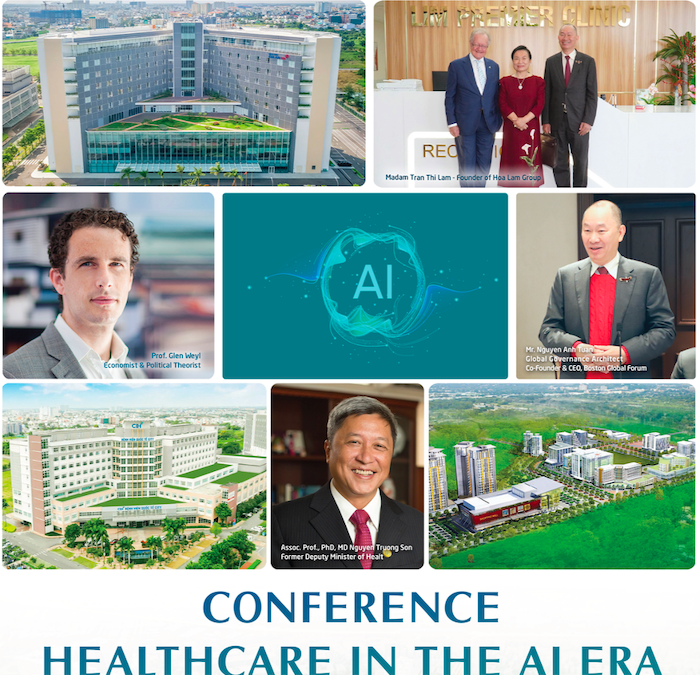
by Editor BGF | Jan 11, 2026 | News
Nguyen Anh Tuan, Global Governance Architect; Co-Founder, Co-Chair, and CEO of the Boston Global Forum (BGF) will deliver a featured presentation at the conference “Healthcare in the AI Age,” hosted by Madam Tran Thi Lam, Founder of Hoa Lam Group, at Hoa Lam Gia An 115 in Ho Chi Minh City on January 14, 2026.
The program is expected to convene leaders and representatives from Vietnam’s health sector, distinguished international and Vietnamese healthcare experts, and members of the BGF–AIWS Family, including Glen Weyl and Harvard Professor Alisha Holland.
In his keynote, Nguyen Anh Tuan will introduce the AIWS Healthcare Model—a human-centered framework that redefines healthcare in the AI Age “not as a system that reacts to illness,” but as a civilizational approach that helps people live healthier, more peaceful, more dignified, and more meaningful lives, integrating physical, mental, emotional, spiritual, and social well-being 24/7 across the lifespan.
He will highlight the model’s paradigm shift from episodic, hospital-centered, efficiency-first care toward continuous 24/7, whole-human, dignity-first, human-led AI.
The presentation will also outline the proposed AIWS Healthcare Architecture—spanning a Data & Life Context layer, an AI Intelligence layer (predictive, preventive, mental & emotional well-being, personalized care, and ethics & safety), a Human Care & Governance layer (including clinicians, psychologists, spiritual counselors, ethicists, and family/community support networks), and an Experience & Companionship layer designed around a kind, human-facing health companion.
A central element is the AIWS Healthcare Companion (“AI Angel for Health”), designed to monitor health continuously, detect early warning signals, reduce stress and anxiety, support emotional balance, respect faith and sacred values, and escalate to human care when needed—“a good, kind, and ethical companion—not a controller.”
The conference will also discuss governance safeguards to prevent the dark side of AI in healthcare—rejecting over-commercialization, dehumanization, data exploitation, and algorithmic decisions without human responsibility—anchored by the guiding question: does this deployment make life healthier, kinder, and more meaningful?
This event continues the momentum of Vietnam’s post-London implementation dialogue and advances the AIWS commitment to a healthcare future where AI accelerates care without sacrificing human dignity, compassion, and trust.
Please see full here: https://bostonglobalforum.org/publication/aiws-healthcare-whitepaper/
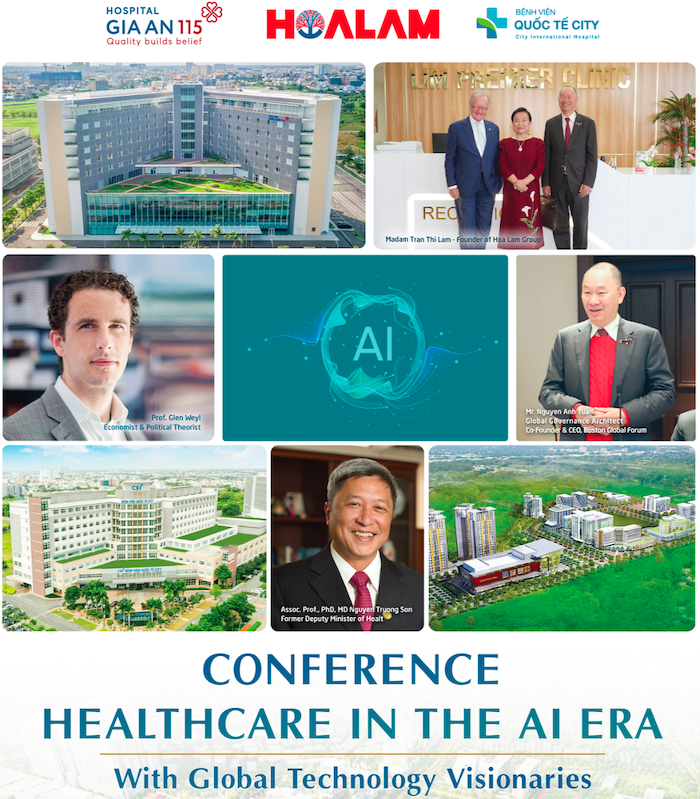

by Editor BGF | Jan 11, 2026 | News
As part of America at 250 – A Beacon for the AI Age, we propose America Civic Voice (ACV)—a national civic writing and listening network designed to protect free expression with responsibility and transform citizens’ lived experience into policy-relevant signals. As a civic companion to AIWS Government 24/7, ACV provides a constructive channel for testimony, community reports, solution sketches, and evidence—then synthesizes that input into explainable briefs, early warnings, and priority maps for leaders and institutions. ACV is built with constitutional safeguards, transparent standards, and an appeals process to prevent doxxing, incitement, manipulation, and dehumanization. It restores trust by closing the loop: “We heard you → Here’s what changed.” Integrated with large-scale deliberation approaches associated with MIT Professor Alex “Sandy” Pentland (BGF Board Member), ACV strengthens public reasoning—surfacing common ground, clarifying tradeoffs, and accelerating meaningful governance outcomes—so that America’s 250th anniversary becomes a launchpad for democratic renewal in the AI Age.
Please see full here: https://bostonglobalforum.org/publication/america-civic-voice-acv/

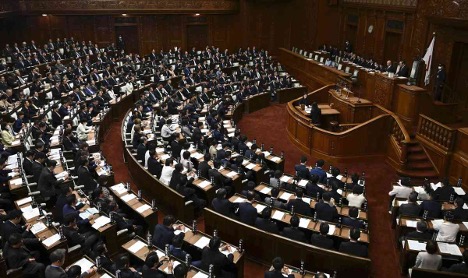
by Editor BGF | Jan 11, 2026 | Shinzo Abe Initiative for Peace and Security, News
When a Japanese prime minister dissolves the House of Representatives, history is made—because the act is not only procedural, but philosophical. It is a choice to “reset” political legitimacy by asking the public for a renewed mandate, often under intense pressure and uncertainty. Past leaders have framed dissolution as a test of confidence and direction—turning parliamentary mechanics into a national referendum on leadership and strategy.
For the Shinzo Abe legacy, this moment carries special weight. Abe’s dissolutions—most famously in 2014—were used to seek public judgment on major national course corrections, including the economic program known as “Abenomics.” His approach established a modern template: decisive moves, high stakes, and an appeal to voters to legitimize a strategic agenda.
Now, as Japan enters the Sanae Takaichi era, the same instrument can become either a democratic accelerant—or a destabilizing gamble. The political environment surrounding her rise has already underscored how coalition arithmetic and public trust can quickly become defining constraints.
For BGF’s Shinzo Abe Initiative, the key question is not only whether dissolution is “for better or worse,” but whether it advances Abe’s deeper vision: openness, rule-based governance, and democratic credibility under geopolitical stress. In the AI Age, legitimacy must be earned faster—but also more transparently, more ethically, and with stronger civic trust.
https://japannews.yomiuri.co.jp/politics/politics-government/20260110-303272/











